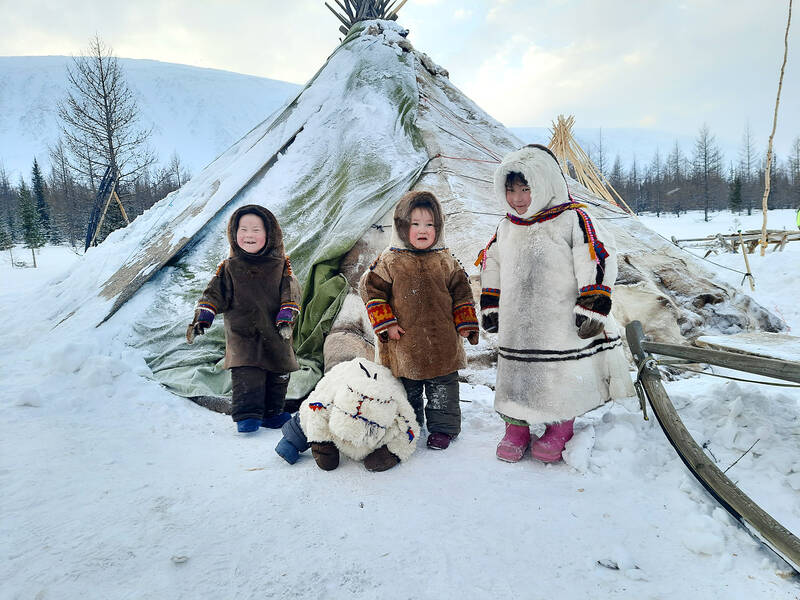The Arctic is not known for its abundance. On the contrary, people often think of it with a shiver, not only because of the brutal cold, but also because of the apparent lack of all forms of life. However, for the indigenous people of the area, including the “Inuit,” the Arctic has always been a place that provides for them. Despite conflicts with invaders and governmental persecution, Inuit culture has continued to connect people to the land — but climate change now threatens to undo that.
For millennia, Inuit have lived and hunted on the ice in regions that are now Greenland, the US state of Alaska, and the northernmost territories and provinces of Canada. But wherever they were, the continuity of their life on that land was disrupted by the arrival of Europeans. In 1950, the Canadian government even forced Inuit to settle in stationary communities as a way to “civilize” them. This removal from the seasonal cycles of hunting and gathering that had sustained Inuit for generations was devastating. Their traditional knowledge was harder to apply when they were isolated in solitary settlements, but skills like reading the weather remained both viable and valuable.
As climate change has become a more urgent problem, and abnormal weather patterns have dominated the news worldwide, even those traditional Inuit methods of reading the weather have become unreliable. In many communities, elders have ceased sharing their wisdom, as they feel it has become useless. As more ice melts, the same thing is happening to skills related to navigating it on land and on the sea.

Fortunately, some adolescents are still apprenticing with elders, and some indigenous-led councils are doing their best to record as much of the old knowledge as they can. Without a widespread change in the way we face climate change, though, that saved knowledge will never be put to use again.
北極並不以其資源豐富而聞名。相反,人們往往一想到它就會不禁冷顫,不僅是因為酷寒,更因此地明顯缺乏生機。然而,對於該地區的原住民,包括「因紐特人」來說,北極一直是供給他們生活所需的地方。儘管與入侵者發生衝突並受到政府迫害,因紐特文化持續將族人與這片土地連結起來——但氣候變遷現正威脅著要消滅因紐特文化。
幾千年來,因紐特人一直在現今的格陵蘭、美國阿拉斯加州以及加拿大最北端的領土和省份的冰上生活與狩獵。但無論他們身在何處,他們在那片土地上生活的持續性都因歐洲人的到來被打亂。西元1950年,加拿大政府甚至強迫因紐特人在固定社區定居,以此來「教化」他們。這種將世代供養因紐特人的季節週期性狩獵及採集移除是毀滅性的。當他們被孤立於單一的定居點時,他們的傳統知識更加難以應用,但判讀天氣等技能仍然可行且有價值。
隨著氣候變遷成為一項更加緊迫的問題,異常的天氣模式已經佔據了全球新聞的版面,即便是那些因紐特傳統的判讀天氣方法也已變得不可靠。在許多社區,長者已經停止傳授他們的智慧,因為他們覺得它變得毫無用處。隨著更多的冰層融化,在陸地及海上航行於冰的技能也發生了同樣的事情。
幸運的是,一些青少年仍跟著長者當學徒,還有一些原住民領導的委員會正在盡最大努力記錄盡可能多的舊知識。但是,如果我們應對氣候變遷的方式沒有發生廣泛變化,那麼保存下來的知識將再次永無用武之地。
Key Vocabulary
1. abundance n. 豐富;充足
There’s an abundance of hotels in this tourist town, so I’m sure we’ll find somewhere to stay.
在這個觀光小鎮上有許多飯店,所以我確定我們會找到地方住的。
2. indigenous n. 當地的;本土的
In Taiwan, there are 16 indigenous tribes, making up about 2.4 percent of the island’s population.
台灣有十六個原住民族,約佔全島人口的百分之2.4。
3. undo vt. 消除;解開(三態undo-undid-undone)
It is impossible to undo all the damage the previous administration has done in the past few years.
前任政府在過去幾年中造成的所有損害是無法消除的。
4. continuity n. 連續性;連貫
Historical documents prove the continuity of the business’s leadership. It’s been in the same family for 200 years.
歷史檔案證明了這間企業領導層的連續性,兩百年來一直是同一個家族。
5. civilize vt. 教化;使有教養
It is very difficult to civilize people who have bad manners.
要教化沒禮貌的人是非常困難的。
6. sustain adj. 使生存;維持;持續
There’s a typhoon coming, so we bought enough tissue paper and food to sustain us.
颱風要來了,所以我們買了足夠的衛生紙和食物來維持生活。
7. devastating adj. 毀滅性的;令人震驚的
This city is still recovering from the devastating flood that happened here five years ago.
這座城市仍然在從五年前發生在此的毀滅性洪水中恢復。
8. solitary adj. 獨自的;單獨的
Hardy wanted to be by himself, so he moved to the countryside where he lived a solitary life.
哈帝想要獨處,所以他搬到鄉間過著獨居生活。
9. abnormal adj. 異常的;反常的
The child’s recent abnormal behavior concerned her parents and teachers, and they wanted to find the cause.
那孩子最近異常的行為讓她的父母和老師們都很擔心,他們想找出原因。
MORE INFORMATION
the Arctic 北極(地區)
persecution n. 迫害;虐待
millennium n. 一千年(複數 millennia)
stationary adj. 固定的;靜止的;穩定的
navigate v. 航行;導航;瀏覽
apprentice v. 當學徒;見習
學習音檔: https://magazine.english4u.net/Magdata/menu/lkmpb
《空中美語》雜誌APP免費下載: https://www.english4u.net/apps/index.aspx
免費收聽當月《空中美語》雜誌課文朗讀及解析 !
文章由AMC空中美語授權使用: https://www.english4u.net

A: As reality TV show “Culinary Class Wars” causes a sensation, it may be more difficult to make a reservation at the show’s judge Paik Jong-won’s Taipei restaurant, Bornga Korean BBQ. B: The other judge, Anh Sung-jae, also served as a guest chef at Regent Taipei last June. A: Korean food has become a new trend in Taiwan lately, and restaurants such as Samwon Garden are quite popular. B: But that restaurant is so pricey. A: Then try the more affordable places, like my favorite, OKAY Korean BBQ, or others such as Annyeong Korean BBQ and OvenMaru Chicken. A:

Colorado has taken a pioneering move towards protecting consumer privacy in the age of brain-computer interfaces. With the rise of neurotechnology, which involves technology that monitors and interacts with the brain, data privacy concerns are coming to a head. In response to growing anxieties, Colorado has become the first state in the US to pass an amendment that safeguards the privacy of human brainwaves. On April 17, Colorado announced an update to its Privacy Act, which went into effect on August 6. The new Colorado Privacy Act classifies brainwaves as “sensitive personal information,” offering them the same protections that

The Australian government will legislate for a ban on social media for children under 16, Prime Minister Anthony Albanese said on Thursday last week, in what it calls a world-leading package of measures that could become law late next year. Australia is trialing an age-verification system to assist in blocking children from accessing social media platforms, as part of a range of measures that include some of the toughest controls imposed by any country to date. Albanese cited the risks to physical and mental health of children from excessive social media use, in particular the risks to girls from harmful depictions of

Continued from yesterday(延續自昨日) https://www.taipeitimes.com/News/lang Neurotechnology used to be limited to scientific labs and hospital settings. However, many new devices that can record consumers’ brainwaves or analyze the brain in other ways have been launched in recent years. Often marketed outside the realm of medical equipment, these devices evade the existing safety and privacy standards for healthcare devices. Experts are raising concerns about this lack of oversight, fearing the potential for these tools to become mind-reading devices without users’ consent or knowledge. Other US states are considering similar regulations to protect their citizens in regard to neuro data gathered by technology companies. Colorado’s